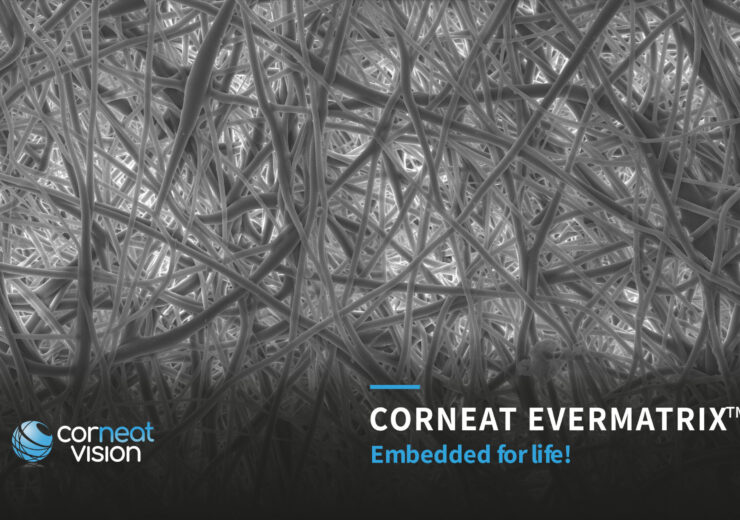EverMatrix is a non-degradable, 100% synthetic, biomimetic Extra Cellular Matrix (ECM) that triggers complex biological processes, stimulating cellular proliferation and colonisation to enable tissue integration with live human tissue

SEM Microscopy of CorNeat EverMatrix. (Credit: PRNewswire/CorNeat Vision)
Israel-based biomimetic implant and technology company CorNeat Vision has unveiled an advanced tissue-integrating material technology, dubbed EverMatrix.
EverMatrix is designed to be a non-degradable, 100% synthetic, biomimetic Extra Cellular Matrix (ECM) that easily and permanently integrates with live human tissue.
Once implanted, the material triggers complex biological processes, stimulating cellular proliferation and colonisation to enable tissue integration without adverse response.
The company developed its first EverMatrix-based product, CorNeat EverPatch, and has submitted it for the US Food and Drug Administration (FDA) approval.
CorNeat EverPatch is a scleral reinforcement patch designed to displace the use of donor and processed tissue products in ocular surface surgery and is expected to be commercialised early in 2023.
CorNeat Vision co-founder and CMO Gilad Litvin said: “The main issue with implants and implantables is the foreign body response they trigger. Our immune system will work to either degrade and eventually absorb foreign or implanted material or encapsulate it with a granuloma.
“Devices that aim to integrate with tissue, eventually get absorbed. Until now, no one has found a way to seamlessly and permanently integrate synthetic material and literally embed it with the surrounding tissue.”
CorNeat Vision has evaluated the tissue integration capabilities of EverMatrix in various in-vitro, preclinical animal studies and clinical studies in humans.
The study results were consistent in different integration sites, including implantations under the skin (subcutaneous), under the conjunctiva, and in the gingiva.
The histological evidence from all the studies showed full fibroblast colonisation and abundant collagen deposition within the matrix.
Also, the integration prevented capsule formation and capillaries coursed their way through the material in some cases, rendering it an integral part of the tissue, said CorNeat Vision.
CorNeat Vision CEO and R&D VP Almog Aley-Raz said: “Everyone that worked with this material just loved it. It is flexible and extremely durable, doesn’t rip when sutured, and is significantly thinner than other tissue products.
“This, plus the fact it cannot carry disease, translate to a significantly lower risk profile than the standard of care. Still, the main advantage of the EverMatrix is its permanency.”
Furthermore, the company said that three other products, including the CorNeat KPro, its artificial cornea, will gradually reach the market in the coming two to three years.
